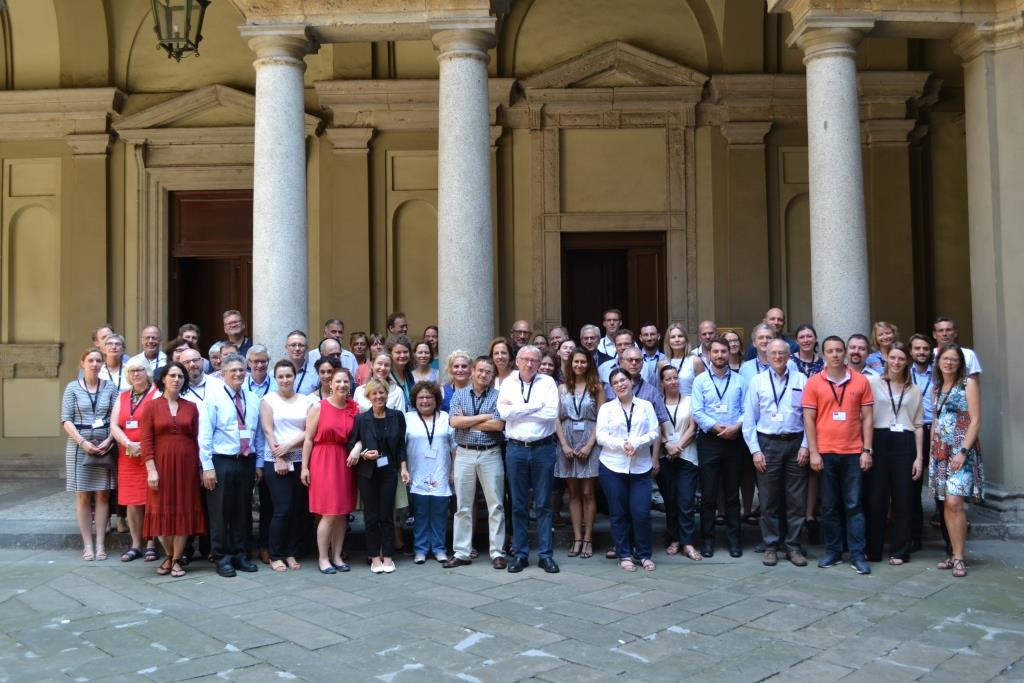EHRI Gathers in Milan for its Annual Partner Meeting
In 2017 the beautiful city of Milan formed the background for the annual General Partner Meeting of the consortium that develops the European Holocaust Research Infrastructure (EHRI). Nearly seventy people, active for any of the 24 partner institutions and based in one of 17 countries that participate in the making of EHRI, gathered to present, discuss and evaluate the results and future of the project.
On the morning of 5 July the General Partner Meeting was opened by Gadi Luzzatto Voghera, the director of the hosting institution, the Jewish Contemporary Documentation Center (CDEC). The meeting was located in the Palazzo Marino, a sixteenth century palace filled with frescos and stuccos that made for an impressive setting. After the welcoming by Gadi, Project Director Conny Kristel took over to start the first session with an import issue: the sustainability of EHRI. The management of EHRI has written a proposal for the European Strategic Forum (ESFRI) Roadmap 2018. This will give EHRI the opportunity to prepare a more permanent existence for the project.
The second session of the meeting was dedicated to data integration, services for archives and digital research. It started with a presentation on the digital historiography of the Holocaust that elaborated on how the integration of computational and historical thinking can work in EHRI. Other presentations included more information on the services EHRI provides to institutions such as archives and museums; the several ways in which EHRI tries to improve the usability and user experience of the services and tools developed; and the way EHRI will go about including more collection descriptions in the portal, especially focusing on countries that have no descriptions yet. The last year EHRI has already gathered descriptions from several countries (e.g. Moldova, Serbia and Slovakia), but the work will continue for the following period.
After a lunch break that many used to enjoy the warm Italian sun and aromatic Italian coffee, the meeting continued with a session on Public History. Focusing for example on an experimental and inspirational product created by students from MediaLAB, which is part of the Amsterdam University of Applied Sciences. They built two interactive websites, named Resonance, to engage a bigger audience – especially young adults – with lesser-known facts about the start of the Holocaust in Germany during the 1930s, and about the music produced in the ghetto of Terezin. During this session
on Public History, the meeting also witnessed the live publication of a brand new Document Blog post. The post focuses on the Hungarian Arrow Cross Party that was responsible for massacres in Budapest right at the end of the war. By using innovative visualisation and mapping tools, the post demonstrates new ways of displaying archival material, that can ultimately lead to new research insights. In the same vein the session continued with a presentation about the EHRI online course on researching the Holocaust through primary sources. This course targets graduate-level students and has received enthusiastic feedback.

The following session of the General Partner Meeting focused on bringing communities together across Europe through workshops, training seminars and fellowships that EHRI provides and organises. Next to a digital research infrastructure, it is important for EHRI to build on the human research networks to contribute to Holocaust research and knowledge. The concluding presentation about the usage of the EHRI portal brought these two important aspects of the project – technology on the one hand and human connections on the other – together.
After a long but inspiring day the General Partner Meeting was finished, but the following day everyone would meet at yet another extraordinary location – the Memoriale della Shoah of Milan – for smaller working sessions.
Over all, the General Partner Meeting was a successful event that will inspire everyone involved to continue EHRI’s work.
Elske Rotteveel, EHRI Project Manager